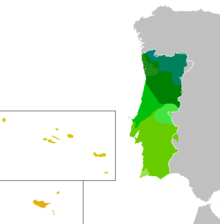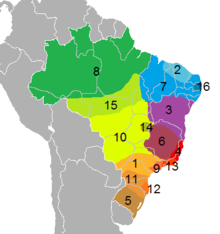Portuguese language
![]()
portuguese is a redirect to this article. For other meanings, see Portuguese (disambiguation).
The Portuguese language (Portuguese português) is a language from the Romance branch of the Indo-European language family and forms the closer unit of Ibero-Romance with Spanish (the Castilian language), Catalan and other languages of the Iberian Peninsula. Together with Galician in northwestern Spain, it goes back to a common language of origin, Galician-Portuguese, which developed between late antiquity and the early Middle Ages. After the formation of the statehood of Portugal, the two present-day languages developed from it. Today, Portuguese is considered a world language.
It is spoken by over 240 million native speakers; including second language speakers, the number of speakers is about 270 million.
The Portuguese language spread around the world in the 15th and 16th centuries as Portugal built its colonial empire, which lasted in parts until 1975 and included what is now Brazil as well as territories in Africa and coastal Asia. The last to pass from Portuguese possession to China was Macau. As a result, Portuguese is now the official language of several independent states and is also spoken by many people as a minority or second language. In addition to Portuguese proper, there are about twenty creole languages on a predominantly Portuguese basis. Due to emigration from Portugal, Portuguese has become an important minority language in several states in Western Europe and in North America in recent decades.
Relationship with other languages
Portuguese, as a Romance language, has parallels with Spanish, Catalan, Italian, French, Romanian and the other Romance languages, especially in terms of grammar and syntax. In particular, it is very similar to Spanish in many aspects, but there are significant differences in pronunciation. However, with some practice, it is possible for a Portuguese to understand Spanish. If you consider the following sentence:
Ela fecha sempre a janela antes de jantar. (Portuguese)
Ela pecha sempre a fiestra antes de cear. (Galician)
Ella cierra siempre la ventana antes de cenar. (Spanish)
Almost all words in one language have very similar cognates in the other language, but these may be used very rarely.
Ela encerra sempre a janela antes de cear. (Portuguese, with little use of words)
(The phrase means, 'She always closes the window before dinner.')
(Latin: 'Illa claudit semper fenestram ante cenam.')
However, there are also a number of words where there is no relationship between the languages, causing problems for the respective speakers in the other country. Examples:
| German | Spanish | Portuguese | Portuguese (Brazil) |
| raw ham | jamón (serrano) | presunto | presunto (cru) |
| Cooked ham | jamón dulce (York) | fiambre | presunto |
| Car repair shop | taller | oficina | oficina |
| Office | oficina | escritório | escritório |
| Train | tren | comboio | trem |
There are places where Spanish and Portuguese are spoken side by side. Native speakers of Portuguese can usually read Spanish and often understand spoken Spanish relatively well; conversely, the latter is usually not the case due to the phonetic peculiarities of Portuguese.
See also: Comparison of Spanish and Portuguese
Dialects
Standard Portuguese, also known as Estremenho, has changed more frequently throughout history than other variations. All forms of the Portuguese language of Portugal can still be found in Brazilian Portuguese. African Portuguese, especially the pronunciation of São Tomé and Príncipe (also called Santomense), has many similarities with Brazilian Portuguese. The dialects of southern Portugal have also preserved their idiosyncrasies, which include the particularly frequent use of the gerund. On the other hand, Alto-Minhoto and Transmontano in northern Portugal are very similar to Galician.
Standard Portuguese from Portugal is the preferred pronunciation in the former African colonies. Therefore, two forms can be distinguished, namely European and Brazilian; where it is commonly distinguished four major standard pronunciations, those of Coimbra, Lisbon, Rio de Janeiro and São Paulo, these are also the most influential pronunciations.
The most important pronunciations of Portuguese are the following, each with an audio example as an external link:
| Dialect | Audio sample | Spoken in | ||
| Portugal | ||||
| Açoriano | Audio sample | Azores | ||
| Alentejano | Audio sample | Alentejo | ||
| Algarvio | Audio sample | Algarve | ||
| Alto Minhoto | Audio sample | North of the city of Braga | ||
| Baixo-Beirão; | Audio sample | Inner Central Portugal | ||
| Beirão | Audio sample | Central Portugal | ||
| Estremenho | Audio sample | Regions around Coimbra | ||
| Lisboeta | Regions around Lisbon | |||
| Madeirense | Audio sample | Madeira | ||
| Nortenho | Audio sample | Regions around Braga and Porto | ||
| Transmontano | Audio sample | Trás-os-Montes | ||
| Brazil | ||||
| Caipira | Brazilian hinterland, including a large part of the state of São Paulo, Paraná, Mato Grosso do Sul, Goiás and southern Minas Gerais | |||
| Capixaba | State of Espírito Santo | |||
| Fluminense | Audio sample | State of Rio de Janeiro | ||
| Baiano | Bahia and Sergipe | |||
| Gaúcho | Rio Grande do Sul and Uruguay | |||
| Mineiro | State of Minas Gerais | |||
| Northestino | Audio sample | Northeastern States of Brazil | ||
| Nortista | Amazon Basin | |||
| Paulistano | Between megalopolis São Paulo in the west to do border with Rio de Janeiro state in the east | |||
| Sertanejo | States of Goiás, Mato Grosso and Mato Grosso do Sul | |||
| Sulista | State of Santa Catarina and central-southern State of Paraná | |||
| Africa | ||||
| Luandense (Angolano) | Audio sample | Angola - region of the capital Luanda | ||
| Benguelense | Audio sample | Angola - Benguela Province | ||
| Sulista | Audio sample | Angola - South of the country | ||
| Caboverdiano | Audio sample | Cape Verde | ||
| Guineense | Audio sample | Guinea-Bissau | ||
| Moçambicano | Audio sample | Mozambique | ||
| Santomense | Audio sample | São Tomé and Príncipe | ||
| Asia | ||||
| Timorense | Audio sample | East Timor | ||
| Macaense | Audio sample | Macau, China | ||
| Audio samples from Instituto Camões, Portugal: www.instituto-camoes.pt | ||||
Some examples of words that are called differently in Portugal than in Brazil or Angola are given below:
| Germany | Portugal | Brazil | Angola |
| Pineapple | ananás¹, sometimes abacaxi² | abacaxi², sometimes ananás¹ | abacaxi², sometimes ananás¹ |
| go away, leave | ir embora¹ (or bazar³ among young people) | ir embora¹ (or vazar among young people) | bazaar³, ir embora¹ |
| Bus | autocarro¹ | ônibus² | machimbombo³ |
| Mobile | telemóvel¹ | celular² | telemóvel¹ |
| Slum, shanty town | bairro de lata¹ | favela² | musseque³ |
¹ Portuguese origin ² Brazilian origin ³ Angolan origin (Machimbombo is probably of Mozambican origin)
Differences in the written language
Portuguese had two varieties of written languages (Port. variedades), often referred to as padrões (standards), until the Acordo Ortográfico came into force in 2009. These are:
- European and African Portuguese
- Brazilian Portuguese
The differences between these variants concern vocabulary, pronunciation and syntax, especially in colloquial speech, whereas in the language of the upper classes these differences are less pronounced. However, these are dialects of the same language, the speakers of the two variants can easily understand the other.
Some differences in vocabulary are in fact none. In Brazil, the standard expression for 'carpet' is wallpaper. In Portugal, it is more common to use alcatifa. However, in Portugal there is also the regional expression wallte, just as in Brazil there is the regional expression alcatifa. For old words this is almost generally true, while in new words these differences are in fact country-specific, such as ônibus in Brazil and autocarro in Portugal.
More significant differences existed in orthography until the Acordo Ortográfico. In words containing cc, cç or ct, the first c is omitted in Brazil; in words containing pc, pç or pt, the p is omitted. These letters are not pronounced, but rather represent remnants from Latin, most of which have been eliminated in Brazil. Compare with Italian.
A few examples are:
| Latin | Portugal and Africa | Brazil | Italian | Spanish | Translation |
| actio | acção | ação | azione | acción | deed, action |
| directio | direcção | direção | direzione | dirección | Direction |
| (electricus) | eléctrico | elétrico | elettrico | eléctrico | electrical |
| optimus | óptimo | ótimo | ottimo | óptimo | great |
In addition, there are some differences in accentuation for the following reasons:
- Different pronunciation: In Brazil, the o in Antônio, anônimo or Amazônia is pronounced closed, whereas in Portugal and Africa it is pronounced open. This is why in Portugal and Africa it is written António, anónimo or Amazónia respectively.
- Simplification of reading: The combination qu can be read in two different ways: ku or k. To make reading easier, in Brazil the u is written with a trema when the pronunciation is ku, i.e. cinqüenta instead of cinquenta (fifty). However, this is no longer provided for in the latest spelling reform (see below).
A spelling reform was adopted with the Acordo Ortográfico in 1990 to achieve an international standard for Portuguese. However, it took until 2009 for the agreement to enter into force in Portugal and Brazil, having been ratified in 2008 by these two countries, as well as by Cape Verde and São Tomé e Príncipe (later followed by Guinea-Bissau; Angola and Mozambique have not ratified it to date, as of October 2014). As part of this reform, Portugal largely dropped the aforementioned c in cc, cç or ct and p in pc, pç or pt, alongside minor standardizations and attempts to agree on a coordinated approach to new loan words from other languages. Since then, spelling in Brazil and Portugal has been largely identical, with differences only for a few exceptions.
Languages derived from Portuguese
When Portugal began to build its colonial empire in the Middle Ages, the Portuguese language came into contact with the local languages of the conquered territories and mixed languages (pidgins) emerged, which were used as a lingua franca in Asia and Africa until the 18th century. These pidgin languages expanded their grammar and lexis over time and became colloquial languages of ethnically mixed populations. They exist under the following names in the following areas:
Cape Verde:
- Barlavento (Criol)
- Crioulo Sotavento (Kriolu)
Equatorial Guinea:
- Fá d'Ambô
Guinea-Bissau and Senegal:
- Crioulo / Kriol
India:
- Creole language of Diu
- Creole language of Vaipim
- Kristi
- Língua da Casa
Macau:
- Macaista
Malaysia, Singapore:
- Cristão/Papiá Kristang
Netherlands Antilles and Aruba:
- Papiamentu
São Tomé and Príncipe:
- Angolar
- Forro
- Lunguyê
Sri Lanka:
- Burgher
Suriname:
- Saramaccaans
Some hybrid dialects exist where Spanish and Portuguese meet:
- A Fala in Spain
- Barranquenho in Portugal
- Portuñol in Uruguay

Distribution of Portuguese dialects in Portugal

Distribution of Portuguese dialects in Brazil
Search within the encyclopedia